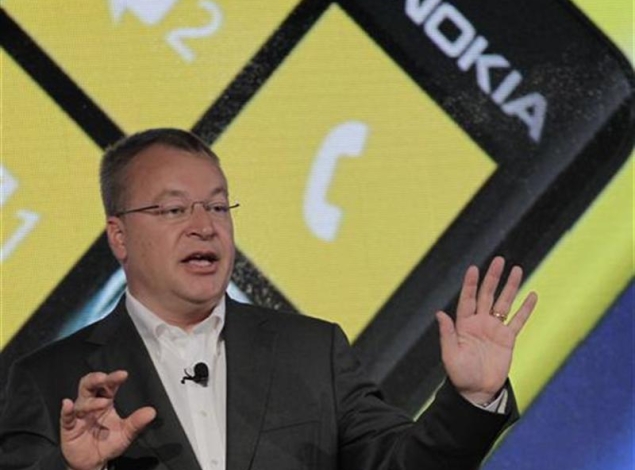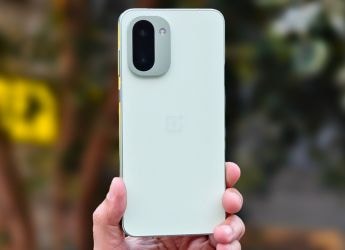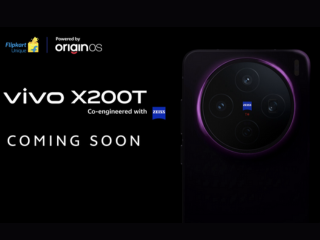- Home
- Mobiles
- Mobiles News
- Nokia CEO explains why they chose Windows Phone over Android
Nokia CEO explains why they chose Windows Phone over Android
By Anupam Saxena | Updated: 19 July 2013 12:36 IST

Click Here to Add Gadgets360 As A Trusted Source

Advertisement
While Nokia has continued to innovate when it comes to developing new hardware and software, supporting the Windows Phone platform like a lone ranger, the apparent lack of interest from Microsoft, specially with updates being far and few has led to disappointing smartphone sales for the Finnish handset giant.
It goes back to early 2011 when Nokia CEO when Nokia realised that it needed something more than Symbian to march ahead in a world which was switching to Apple's iPhone and phones based on Google's Android operating system. Stephen Elop chose his former employer Microsoft as the company's saviour in a bid to become a competitive third alternative. That, unfortunately, hash't happened even after being in transition for the last two years. A number of technology evangelists and Nokia loyalists have questioned Elop's motive in choosing Windows Phone over Android, adding that the steady pace at which Nokia develops new hardware, it would have made perfect sense for the company to have adopted Android, adding its own apps on top and customising it to its own choice.
At a recent round table with journalists, Nokia CEO Stephen Elop responded to this question, saying that he still feels that the company made the right decision. Elop said at the time of making the switch, he was worried that a particular hardware manufacturer (read Samsung) could have dominated Android due to its resources, vertical integration and because Nokia would have been a late entrant in the Android space. The comment was first reported by The Guardian.
Elop said, "I'm very happy with the decision we made."
"What we were worried about a couple of years ago was the very high risk that one hardware manufacturer could come to dominate Android. We had a suspicion of who it might be, because of the resources available, the vertical integration, and we were respectful of the fact that we were quite late in making that decision. Many others were in that space already."
"Now fast forward to today and examine the Android ecosystem, and there's a lot of good devices from many different companies, but one company has essentially now become the dominant player."
He also cited operators like AT&T as a reason for choosing an alternative platform. He said that operators want to negotiate with different people and keep pressure on everybody to have the best range of options. So, being the third ecosystem helps the company. He even suggested that after Apple's iOS, it was Samsung and Android that comes to people's (and operator's) minds as the second best option, so other Android players have been marginalised.
"Now, it's hard - it's very difficult because we are starting as a challenger, we're having to build that credibility; but with partners like AT&T we're gaining that traction . But it was the right decision. You look at a number of other Android providers right now and they're in a tough spot," he added.
While Elop might defend the company's move by highlighting Samsung's current domination of the platform, Windows Phone is still not doing as well as the company expects. Nokia managed to sell 7.4 million Lumia devices in the last quarter, up 32 percent compared to the previous quarter but its revenues decreased inline with the Average Selling Price of its smartphones. Also, it's only budget devices like the Lumia 520 which are contributing to the surge in sales, which was recently confirmed as the most popular Windows Phone in the world.
It goes back to early 2011 when Nokia CEO when Nokia realised that it needed something more than Symbian to march ahead in a world which was switching to Apple's iPhone and phones based on Google's Android operating system. Stephen Elop chose his former employer Microsoft as the company's saviour in a bid to become a competitive third alternative. That, unfortunately, hash't happened even after being in transition for the last two years. A number of technology evangelists and Nokia loyalists have questioned Elop's motive in choosing Windows Phone over Android, adding that the steady pace at which Nokia develops new hardware, it would have made perfect sense for the company to have adopted Android, adding its own apps on top and customising it to its own choice.
At a recent round table with journalists, Nokia CEO Stephen Elop responded to this question, saying that he still feels that the company made the right decision. Elop said at the time of making the switch, he was worried that a particular hardware manufacturer (read Samsung) could have dominated Android due to its resources, vertical integration and because Nokia would have been a late entrant in the Android space. The comment was first reported by The Guardian.
Elop said, "I'm very happy with the decision we made."
"What we were worried about a couple of years ago was the very high risk that one hardware manufacturer could come to dominate Android. We had a suspicion of who it might be, because of the resources available, the vertical integration, and we were respectful of the fact that we were quite late in making that decision. Many others were in that space already."
"Now fast forward to today and examine the Android ecosystem, and there's a lot of good devices from many different companies, but one company has essentially now become the dominant player."
He also cited operators like AT&T as a reason for choosing an alternative platform. He said that operators want to negotiate with different people and keep pressure on everybody to have the best range of options. So, being the third ecosystem helps the company. He even suggested that after Apple's iOS, it was Samsung and Android that comes to people's (and operator's) minds as the second best option, so other Android players have been marginalised.
"Now, it's hard - it's very difficult because we are starting as a challenger, we're having to build that credibility; but with partners like AT&T we're gaining that traction . But it was the right decision. You look at a number of other Android providers right now and they're in a tough spot," he added.
While Elop might defend the company's move by highlighting Samsung's current domination of the platform, Windows Phone is still not doing as well as the company expects. Nokia managed to sell 7.4 million Lumia devices in the last quarter, up 32 percent compared to the previous quarter but its revenues decreased inline with the Average Selling Price of its smartphones. Also, it's only budget devices like the Lumia 520 which are contributing to the surge in sales, which was recently confirmed as the most popular Windows Phone in the world.
Comments
Catch the latest from the Consumer Electronics Show on Gadgets 360, at our CES 2026 hub.
Related Stories
Popular on Gadgets
- Samsung Galaxy Unpacked 2025
- ChatGPT
- Redmi Note 14 Pro+
- iPhone 16
- Apple Vision Pro
- Oneplus 12
- OnePlus Nord CE 3 Lite 5G
- iPhone 13
- Xiaomi 14 Pro
- Oppo Find N3
- Tecno Spark Go (2023)
- Realme V30
- Best Phones Under 25000
- Samsung Galaxy S24 Series
- Cryptocurrency
- iQoo 12
- Samsung Galaxy S24 Ultra
- Giottus
- Samsung Galaxy Z Flip 5
- Apple 'Scary Fast'
- Housefull 5
- GoPro Hero 12 Black Review
- Invincible Season 2
- JioGlass
- HD Ready TV
- Laptop Under 50000
- Smartwatch Under 10000
- Latest Mobile Phones
- Compare Phones
Latest Gadgets
- Tecno Spark Go 3
- iQOO Z11 Turbo
- OPPO A6c
- Samsung Galaxy A07 5G
- Vivo Y500i
- OnePlus Turbo 6V
- OnePlus Turbo 6
- Itel Zeno 20 Max
- Lenovo Yoga Slim 7x (2025)
- Lenovo Yoga Slim 7a
- Lenovo Idea Tab Plus
- Realme Pad 3
- Garmin Quatix 8 Pro
- NoiseFit Pro 6R
- Haier H5E Series
- Acerpure Nitro Z Series 100-inch QLED TV
- Asus ROG Ally
- Nintendo Switch Lite
- Haier 1.6 Ton 5 Star Inverter Split AC (HSU19G-MZAID5BN-INV)
- Haier 1.6 Ton 5 Star Inverter Split AC (HSU19G-MZAIM5BN-INV)
© Copyright Red Pixels Ventures Limited 2026. All rights reserved.

















